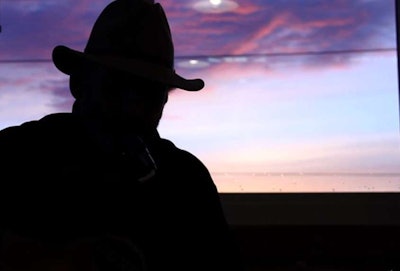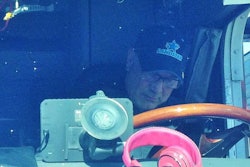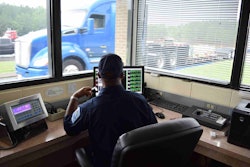Owner-operator Gary Buchs regular readers will likely remember from the load I joined him on last year, which yielded a variety of insights into his business thinking, or his nod as this year’s TCA’s Owner-Operator of the Year. He’s leased to Landstar, dispatching himself working with a variety of the company’s independent freight agents and taking constant temperature of his market on the in-house load board.
Buchs made a voluntary switch to an Omnitracs AOBRD a couple years back now, so he’s been on e-logs quite some time. Not that it was a quick adjustment. In this most recent edition of the Overdrive Radio podcast, he runs through some of what he went through early on making that switch, likewise his worries for freight market health with the rise of tech-enabled brokerage and hopes for rates, at least, in the short-term, despite what he sees as the inevitability of a “hangover” after the big increases he’s seen recently. Take a listen here or above:
Podcast: Play in new window | Download
There’s plenty to wade through and hopefully give you ideas there. But there’s one thing related to the issue of emotions running high, now that the mandate is here, that didn’t get captured in the audio. In a way, it summed up Buchs’ thinking on the mandate and most of the related issues of profitability going forward. “We want to get emotional and say, ‘You know, truck driving died on Dec. 18.’ But you know what? It didn’t die, it just changed, and with every change there’s opportunity. We in this industry that do this job – we’ve tended to pride ourselves on working more for less, but we need to not work more for less.”

I know there are plenty out there who would agree in principle, and speaking of one of them …
Wes Memphis and the “Phantom Limb Syndrome”
Regular readers will recall e-log transition guinea pig “Wes Memphis,” a pseudonym for the former owner-operator-turned-driver who was forced into making the switch more than a year and a half ago now and has been periodically guest-blogging here on Channel 19. His experience won’t be applicable to everyone in the audience, given he is dispatched and runs for a fleet that’s invested in trailers for new drop-hook opportunities in van freight.
Nonetheless, he wrote in early this morning with another in his ongoing series of guest contributions to the blog. Track back through his prior installments via this link. Here’s his latest, following ELD-Day 1 yesterday:
 Wes Memphis
Wes MemphisThere is a medical condition known as the “phantom limb syndrome.” It is the phenomenon in which amputees still feel pain in their missing limbs. They still try to pick things up, even though their arm is no longer there. I can’t tell you how many times I reached for that log book in those first months on e-logs; it was as if the part of you that got to tell your own story was now severed from you forever. It was as if you had a phantom limb. Now a machine was recording your movements. There was some real pain in that. It was like picking up the phone to call your mom, and cursing yourself for forgetting she’d passed. At the core, ELDs constituted, to me, the imposition of a left-brained structure on a largely right-brained population. That is why, at least in my opinion, the creative folks out there hate and fear them the most.
There is a certain muscle memory to paper logs. You rely on the trailer numbers, for example, posted on your logsheet when it comes time to fill out your trip report. Well, you get done with your first week on ELDs and you realize, damn it, I didn’t write those trailers down, and I don’t know how to retrieve them in this convoluted system. Meanwhile, dispatch has a learning curve of their own, because a few of the trips you’ve been making for years on paper aren’t really doable in real time. They don’t know what you can actually do legally; they only know what you can show. What’s worse is you’ve been jumping through so many hoops for so long that you’re not even quite sure what you can do in real time. It took about six months to get all that smoothed out. For a while, I felt like a rookie all over again. Like I couldn’t find the groove in the road. It was like running a new set of super singles for the first time — you’re just floating around out there, fighting the wheel.
What kept me sane, kind of, in those early days was writing this column. I am forever in Todd Dills’ debt for that. It has been an outlet, and a way to pop off without killing anyone. So, just three pieces of advice from an old trucker with half his teeth missing:
1) You should allow yourself three major meltdowns before being completely broken into e-logs. Hindsight being 20/20, I should gave warned everyone around me this would happen. My third and final episode found me in my boss’ office to put in my two weeks’ notice. I was completely disarmed when he said, “You’re getting ready to quit me, aren’t you?” Slowly, and skillfully, he talked me off the ledge.
2) Honestly, driver to driver, try to find some kind of outlet that doesn’t wind you up in jail during your break. Anything. Walking, cycling, Youtubing, or maybe blogging. Let’s face it, 10 hours is enough to bore anyone to tears if you don’t have anything else in your life besides driving a truck.
3) The ability to unlearn in a rapidly changing world is sometimes just as important as the ability to learn. I had to unlearn that it was all up to me, that I was a “runner,” the go-to guy. You will hate me for saying this right now, but some good will come out of this unlearning for you. For my part, I no longer have the truck-wreck dream that has hounded my sleep since 1987. I no longer have to go to the chiropractor. I am no longer dependent on sodas and sugary snacks to get through the run. The hardest part for me about all this is I just can’t stop to see extended family along the way anymore, or if I do, it’s only for an hour or so. So I have to plan and be more purposeful throughout the year to make those times happen on my time. Sometimes that works, and sometimes it doesn’t.
It took me about six months to get past the phantom limb syndrome. Now, I wouldn’t go back to paper if I could. –Wes Memphis









